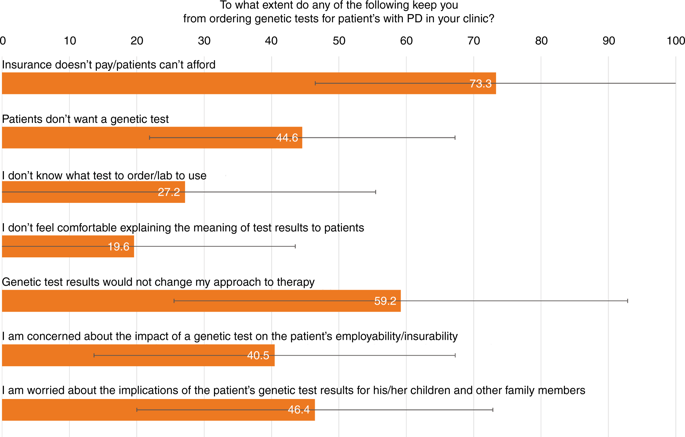Genetics in Medicine ( IF 6.6 ) Pub Date : 2019-11-04 , DOI: 10.1038/s41436-019-0684-x Roy N Alcalay 1 , Caitlin Kehoe 1 , Evan Shorr 1 , Roseanna Battista 2 , Anne Hall 3 , Tanya Simuni 4 , Karen Marder 1, 5, 6 , Anne-Marie Wills 7 , Anna Naito 3 , James C Beck 3 , Michael A Schwarzschild 7 , Martha Nance 8

|
Purpose
Genetic testing for Parkinson disease (PD) has not been widely used in clinical practice. In preparation for upcoming precision medicine–designed clinical trials for GBA and LRRK2, we evaluated movement disorders specialists’ current practice, knowledge, attitudes, and barriers to genetic testing in PD.
Methods
An anonymous questionnaire was sent to movement disorders specialists at 146 Parkinson Study Group (PSG) sites in the United States (n = 131) and Canada (n = 15) to assess their knowledge and attitudes about genetic testing for PD.
Results
One hundred seventy-eight (47.6%) PSG clinicians completed the questionnaire. Forty-one percent of respondents had not referred any PD patients for genetic testing in the last year and >80% reported referring fewer than 11 patients over the same period. Most common reasons for not referring for genetic testing included lack of insurance coverage/cost to the patient and lack of perceived utility. On a scale of 0–100, the mean level of comfort in respondents’ own ability to genetically counsel PD patients on GBA and LRRK2 was 52 (SD = 28). Sixty percent of clinicians correctly answered all questions about the inheritance and penetrance of GBA and LRRK2 variants.
Conclusions
There is an urgent need to increase knowledge and reduce practical barriers to genetic counseling and testing in PD.
中文翻译:

帕金森病基因检测:美国和加拿大运动障碍专家的当前实践、知识和态度。
目的
帕金森病 (PD) 的基因检测尚未广泛用于临床实践。为了准备即将进行的针对GBA和LRRK2的精准医学设计临床试验,我们评估了运动障碍专家目前在 PD 中进行基因检测的实践、知识、态度和障碍。
方法
向美国(n = 131)和加拿大(n = 15)的 146 个帕金森研究小组 (PSG) 站点的运动障碍专家发送了一份匿名问卷,以评估他们对 PD 基因检测的知识和态度。
结果
一百七十八名 (47.6%) 的 PSG 临床医生完成了问卷。41% 的受访者在去年没有推荐任何 PD 患者进行基因检测,超过 80% 的受访者报告称同期推荐的患者少于 11 名。不进行基因检测的最常见原因包括缺乏对患者的保险覆盖范围/成本以及缺乏感知效用。在 0-100 的范围内,受访者自己对GBA和LRRK2的PD 患者进行遗传咨询的能力的平均舒适度为 52(SD = 28)。60% 的临床医生正确回答了有关GBA和LRRK2变体的遗传和外显率的所有问题。
结论
迫切需要增加知识并减少 PD 遗传咨询和检测的实际障碍。











































 京公网安备 11010802027423号
京公网安备 11010802027423号